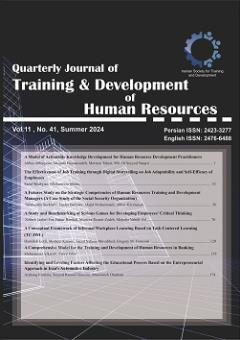Identifying and Leveling Factors Affecting the Educational Process Based on the Entrepreneurial Approach in Iran's Automotive Industry
Subject Areas :ارژنگ عزتی نیا 1 , seyed rasul hoseini 2 * , masome oladiyan 3
1 - PhD student in Educational Management, Faculty of Educational Sciences, Islamic Azad University, Damavand Branch, Tehran, Iran
2 - Associate Professor, Department of Educational Sciences, Faculty of Educational Management, Farhangian University, University of Tehran, Tehran, Iran
3 - Assistant Professor, Educational Sciences, Faculty of Educational Management, Islamic Azad University, Damavand Branch, Tehran, Iran.
Keywords: Education, entrepreneurship, entrepreneurial education, automotive, DEMATEL analysis, structural-interpretive modeling,
Abstract :
This research was conducted with the aim of identifying and leveling the factors affecting the educational process based on the entrepreneurial approach in Iran's automotive industry. This was an applied study in terms of purpose and mixed-exploratory in terms of data collection. The study consisted of a qualitative phase to identify and level the influential factors of the educational process based on the entrepreneurial approach, and also a quantitative phase to determine the effects of the variables and their leveling. Sampling was purposive in both quantitative and qualitative phases using the snowball method. In the qualitative part, first, a semi-structured interview was conducted with 20 academic and organizational experts, including industrial experts such as education custodians (supervisors and heads of education), with the aim of identifying the influential factors. In the quantitative analysis section, the DEMATEL method was applied to determine the influence of the variables, and in the next step, structural-interpretive modeling was used to determine the levels of the factors. The DEMATEL questionnaire was distributed among ten experts, and the effect of the factors was extracted using DEMATEL modeling. The research results yielded 15 key factors in the educational process based on the entrepreneurial approach, which were classified into nine levels.
[1] Shukla S, Tanuku K, Bharti P, Dwivedi A. Global entrepreneurship monitor 2014: India report.
[2] Fayolle A, Verzat C, Wapshott R. In quest of legitimacy: The theoretical and methodological foundations of entrepreneurship education research. International Small Business Journal. 2016 Nov;34(7):895-904.
[3] Jones C, Penaluna K, Penaluna A. The promise of andragogy, heutagogy and academagogy to enterprise and entrepreneurship education pedagogy. Education+ Training. 2019 Oct 25.
[4] Gamede BT, Uleanya C. Impact of entrepreneurship education on business organisations. Journal of Entrepreneurship Education. 2019 Jul 1;22(2):1-1.
{5} شریفی فر, فریده, محمدیان, فریبا. عوامل درون سازمانی اثرگذار بر کارآفرینی سازمانهای ورزشی: یک فراتحلیل. پژوهش های معاصر در مدیریت ورزشی, 1396; 7(14): 53-64. doi: 10.22084/smms.2018.14757.2105
[5] Liguori E, Corbin R, Lackeus M, Solomon SJ. Under-researched domains in entrepreneurship and enterprise education: primary school, community colleges and vocational education and training programs. Journal of Small Business and Enterprise Development. 2019 Apr 9.
[6] Mohd Zahari AS, Mahmood R, Yaacob NM, Ibrahim N, Nik Jaafar NF. The impact of entrepreneur education on business performance.2020
[7] Hasan SM, Khan EA, Nabi MN. Entrepreneurial education at university level and entrepreneurship development. Education+ Training. 2017 Aug 14.
[8] Kariv D, Matlay H, Fayolle A. Introduction: Entrepreneurial trends meet entrepreneurial education. InThe role and impact of entrepreneurship education 2019 May 31 (pp. 1-11). Edward Elgar Publishing.
[9] Mehrabad M, Mohtadi MM. Impact of Entrepreneurship Education on Entrepreneurial Behavior Development (Case Study: Entrepreneurship Education of Ministry of Labor and Social Affairs). Entrepreneurial Development. 2013:73-57.
[10] Solomon G. An examination of entrepreneurship education in the United States. Journal of small business and enterprise development. 2007 May 22.
[11] Caggiano V, Akanazu H, Furfari A, Hageman A. Entrepreneurship education: A global evaluation of entrepreneurial attitudes and values (a transcultural study). Journal of Educational, Cultural and Psychological Studies (ECPS Journal). 2016 Dec 16;1(14):57-81.
[12] Leon JA, Gorgievski M, Lukes M. Teaching psychology of entrepreneurship. Retrieved December. 2008;1:2012.

